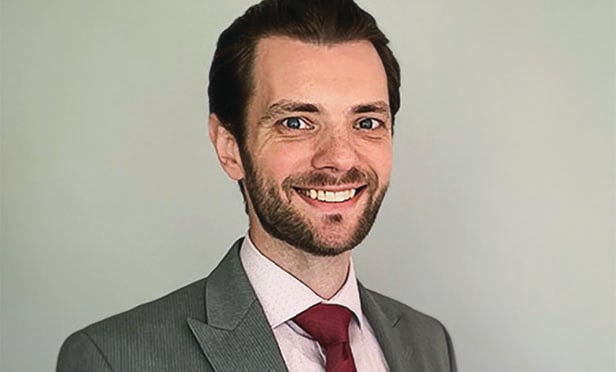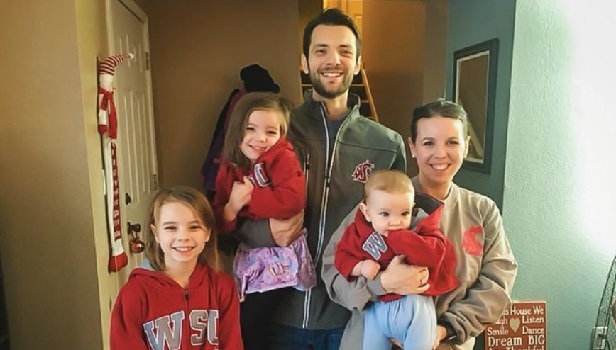 Chris Wolpert is the founder of Group Benefit Solutions in Tacoma, Washington, a risk-mitigation and cost-containment consulting firm with expertise in converting a top P&L liability into earnings for employers, while increasing the quality of life for their employees.
Chris Wolpert is the founder of Group Benefit Solutions in Tacoma, Washington, a risk-mitigation and cost-containment consulting firm with expertise in converting a top P&L liability into earnings for employers, while increasing the quality of life for their employees.
Paul Wilson: How did you get your start in the benefits industry?
Coming out of college, I was doing insurance claims and hated it. I wanted to get onto the sales side, so I became a financial advisor in 2009. Not exactly the best time to enter that industry; and we had an infant, so it was a scary time.
As the implementation of the ACA began to inch closer, many of my clients said, “What I really need help with is figuring out what the ACA will mean for me and my company.” I had no experience in that area, so I ended up referring a guy I knew. At one point, he said, “I'm always looking for somebody who is potentially interested in what I do on the health side to take over my book of business.” I eventually came back to him and said, “I'm not satisfied with what I'm doing. I'd love to have someone teach me the business.” There were a bunch of people who were getting out of the industry, so I saw that as the opportunity. The playing field had been completely leveled; no one had any more experience in dealing with ACA compliance and all the new regulations than I did.
Related: ACA confusion a boon for health care consultants
I worked with him for a few years, and that plan for him to ride off into the sunset kept getting pushed back and delayed. Three years ago, I decided I was done waiting. Someone had given me a copy of “Do or Die” by Nelson Griswold and Scott Cantrell. I read that and said, “OK, this is my playbook.” It's going to be about leveraging technology, cost-containment solutions and automating as much as you can: marketing, service, outreach and billing. The broker I'd been working with wasn't willing to explore any of that but also wasn't willing to let go of the reins, so I went out and on my own and decided to figure it out. Sink or swim.
PW: What have been the highlights and lowlights of striking out on your own?
I have certainly had a lot of challenges. Early on, it was simply, how do I do this all by myself?
I read Tim Ferriss' book, “The 4-Hour Workweek” and he talks a lot about automation and building your lifestyle. I wanted to do that with my business. Many entrepreneurs don't have a big office building or tons of employees, but they have a profitable business. I wanted to build my agency as though it was a startup, where you're bootstrapping in the beginning but can build a well-oiled machine over time.
Slowly, I was able to outsource very important pieces and that freed me up to continue to grow my business, where otherwise, I would have become wrapped up in all the aspects of service and that type of thing. I've been able to expand on that and hire a veteran person to be my client success leader. Once we get the go-ahead, I turn it over to her and she takes it away. She's integrated with everyone on the team, so whether she needs to reach out to a TPA, a carrier or whomever, she can really quarterback the implementation and be the go-to person within the organization. That frees me up to market, prospect and sell.
Some of the valleys I've experienced have come when I've tried to become too involved in the service side of things, where details would get missed or things didn't get handled in a timely manner because I was tied up doing other things and maybe didn't respond until the next morning or later that afternoon.

PW: What are the biggest challenges and opportunities for innovative advisors right now? How receptive are employers to these new ideas?
That's a great question. I had a meeting today where the CFO got it. He completely understood the value proposition of the ideas and what we'd be able to do. I spent the next hour talking to the HR manager, who was very resistant to change. I think part of the challenge is that employers and even the employees themselves have all been conditioned to believe that we can't control the cost of claims and that there's no transparency in the market.
Health insurance and health care are seen as the same thing, when they're really not. When you think about auto insurance, home insurance or any other example, you don't lump those two things together. And yet the financing mechanism and the delivery of care are seen as one and the same when it comes to health care. We've been conditioned to believe it. We've been in this model since the 1960s, since my parents were kids.
But there's this disruptive force that came around the time the ACA was passed and what you're starting to see now is there's a lot of these non-insurance solutions. The biggest thing when trying to unwind a lot of that conditioning is showing employers, “Look you have this problem and you keep trying to solve it with an insurance solution. What you need to do is look at risk-management strategies and the non-insurance strategies we can bring into the fold that are going to help tackle the health care costs.”
Again, to start to go down this road of true cost containment and risk mitigation, doing some things that are considered outside the box is how you'll end up solving this insurance price problem. If you have no ability to have ownership of the data or understand what is going on and therefore being able to introduce risk mitigation strategies that are outside of normal insurance best practices, you're not going to get there.
PW: Do you feel pressure when you hear about potential disruptions like single-payer?
I definitely have a sense of urgency because I'm so small and can be more nimble. I don't necessarily feel pressure, though. One of my mentors told me years ago that “there's benefits advisors up in Vancouver, Canada, who are driving around in Mercedes Benzes.” The point is, maybe the old model will go away one day, but for those who adapt and make the necessary changes, there is going to be a role as a business and risk-management consultant in one form or another.
The way I see it, single-payer is one end of the spectrum and Amazon's new venture, Haven, is the opposite side of things. Ultimately, they're trying to find a free-market solution. In our current health care system, it really isn't a free market. How could it be when you don't have any idea of the cost or quality of what you're buying? That's a real problem.
Because I'm in the Seattle market, I talk about what Haven is doing and tell prospects and clients, “There are solutions and strategies you can implement at a small company.” I have a slide where there are five prescription drugs; if you go to CVS it's going to cost you $930 or something like that, where if you go online, you can get the exact same drugs for $66. This is what Jeff Bezos talks about when they enter a new market and he says, “Your margin is my opportunity.”
Part of the message I bring is yeah, it's great if we can drive savings and allow you to do more with your plans, but we want to help your employees whose wages have stayed relatively flat while their premiums, deductibles and out-of-pocket maximums continue to rise every year and gobble up any minute wage increases they receive. That's a real impact. It has a snowball effect that's pretty powerful. They can get healthy, stay healthy, have better access to the services they need and also have more money in their pockets. That's what the politicians talk about, but we can actually do that. You can copy what Amazon's doing. Whether you're a group of five or 500, there are still things you can do to get control.
PW: What are your favorite things about your job?
The coolest thing to me is there may be someone I never meet face-to-face at any point in my life but I can have a really major impact on them. And I'm also doing my client a service because they're seen as the hero. I enjoy that.
The other thing I enjoy the most is that I've been able to build my business around my lifestyle rather than the other way around. My wife has her own business, which means her schedule is kind of crazy at times, too, so just to be able to have the flexibility we do is great.
PW: Finish this sentence: The key to success in this industry going forward is…
Marketing. That's something we as insurance professionals don't do a great job of. Until recently, no one's necessarily needed to be great at marketing.
Read more from our Face of Change series:
© 2025 ALM Global, LLC, All Rights Reserved. Request academic re-use from www.copyright.com. All other uses, submit a request to [email protected]. For more information visit Asset & Logo Licensing.







